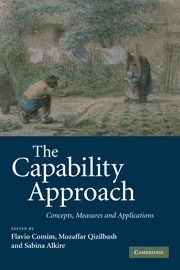Book contents
- Frontmatter
- Contents
- List of figures
- List of tables
- List of contributors
- List of acronyms
- Acknowledgements
- Introduction
- 1 Using the capability approach: prospective and evaluative analyses
- PART I Concepts
- PART II Measures
- 7 Do concepts matter? An empirical investigation of the differences between a capability and a monetary assessment of poverty
- 8 Social exclusion in the EU: a capability-based approach
- 9 Complexity and vagueness in the capability approach: strengths or weaknesses?
- 10 Operationalising Sen's capability approach: the influence of the selected technique
- 11 Operationalizing capabilities in a segmented society: the role of institutions
- PART III Applications
- Index
- References
9 - Complexity and vagueness in the capability approach: strengths or weaknesses?
Published online by Cambridge University Press: 22 September 2009
- Frontmatter
- Contents
- List of figures
- List of tables
- List of contributors
- List of acronyms
- Acknowledgements
- Introduction
- 1 Using the capability approach: prospective and evaluative analyses
- PART I Concepts
- PART II Measures
- 7 Do concepts matter? An empirical investigation of the differences between a capability and a monetary assessment of poverty
- 8 Social exclusion in the EU: a capability-based approach
- 9 Complexity and vagueness in the capability approach: strengths or weaknesses?
- 10 Operationalising Sen's capability approach: the influence of the selected technique
- 11 Operationalizing capabilities in a segmented society: the role of institutions
- PART III Applications
- Index
- References
Summary
So far as laws of mathematics refer to reality, they are not certain. And so far as they are certain, they do not refer to reality.
(Albert Einstein 1922)All traditional logic habitually assumes that precise symbols are being employed. It is therefore not applicable to this terrestrial life but only to an imagined celestial existence [… .] logic takes us nearer to heaven than most other studies.
(Russell 1923, pp. 88–9)All economists know the economy is complex – very complex. That is one of the reasons why society needs economists – to try to make that complexity somewhat simpler and more understandable.
(Colander 2000, p. 1)Introduction
Concepts of poverty and well-being, like many – probably most – issues and phenomena relating to the human sciences are intrinsically complex and vague, though no more so than crucial economic concepts such as utility, rationality, or recession. This is largely due to the fact that they involve a plurality of interrelated variables, dimensions, and spaces with no clear-cut boundaries between them. While both common sense and some of the social sciences (sociology and psychology in particular) plainly acknowledge the intrinsically complex and vague nature of poverty and well-being, the same cannot be said for economics. Only infrequently mentioned, rarely acknowledged at the foundational level, almost always feared and avoided from an empirical point of view, complexity and vagueness are often perceived in economic analysis as elements of weakness within a theoretical framework, and potential obstacles to its operationalization.
Information
- Type
- Chapter
- Information
- The Capability ApproachConcepts, Measures and Applications, pp. 268 - 309Publisher: Cambridge University PressPrint publication year: 2008
References
Accessibility standard: Unknown
Why this information is here
This section outlines the accessibility features of this content - including support for screen readers, full keyboard navigation and high-contrast display options. This may not be relevant for you.Accessibility Information
- 20
- Cited by
